Degree provides steppingstone to careers in health care
The College of Medicine – Tucson’s Bachelor of Science in Medicine program prepares students for careers in health care or advanced medical education.
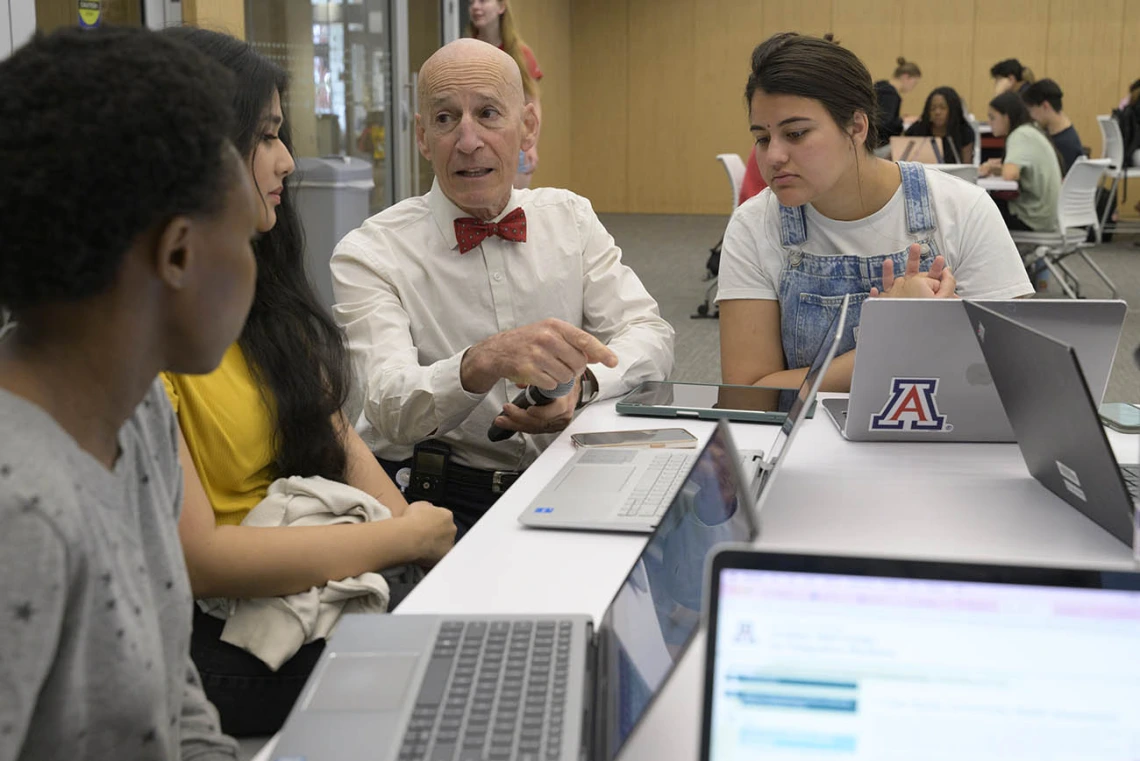
The Bachelor of Science in Medicine program is designed to prepare graduates to enter careers directly in health care support positions or pursue a variety of alternative health care-related careers.
Before Nithin Babu wanted to be a doctor, he was fascinated by dinosaurs. He enjoyed playing with dinosaur toys; he loved learning about the extinct animals. Eventually, his growing knowledge turned into greater curiosity.
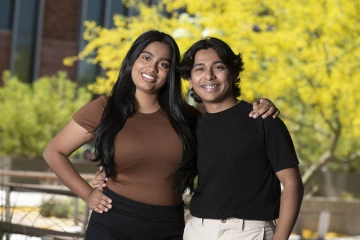
(From left to right): Since they were young, twins Monica and Nithin Babu knew they wanted to pursue careers in medicine. They recently completed their freshman year in the Bachelor of Science in Medicine program.
“I was a dinosaur kid, and I was always wanting to learn more about them,” Babu said. “The more I learned, the more I began to think about life and how interesting life really is. I found myself thinking about how life is defined and how the first cell came about.”
As he grew older, Babu’s interests evolved from dinosaurs to becoming a doctor. It is one of many interests that Babu shares with his twin sister, Monica Babu, who also aspires to practice medicine. That common goal was inspired by their father, an immigrant from India who studied molecular biology before becoming a genetic engineer. Their father’s affinity for science and education fueled the passion that drives Nithin and Monica to pursue their dreams.
The siblings are seeking to turn those dreams into reality at the University of Arizona Health Sciences through a new undergraduate degree program. The Bachelor of Science in Medicine, offered by University of Arizona College of Medicine – Tucson, is intended to create a path for students to pursue careers in clinical care, biomedical research, medical technologies or other health care-related professions.
“I believe the program offers undergraduate students a window into the health professions that no other program on campus offers,” said Paul Gordon, MD, MPH, co-director of the Bachelor of Science in Medicine program and professor of pharmacology and family and community medicine at the College of Medicine – Tucson. “While we are not necessarily the only way to go nor the best way to go for every student, we are proud to be one of the ways to go for undergraduate students seeking a career in health professions.”
Gaining interprofessional perspectives
The Bachelor of Science in Medicine is a four-year program designed and delivered as a collaboration between medical care professionals, basic scientists and humanists, focusing on clinical reasoning and case-based learning. Nearly half of the classes are taught by practicing physicians. Dr. Gordon teaches two of the major’s core courses, BSM 201 Healthcare Professional and BSM 296 Careers in Medicine.
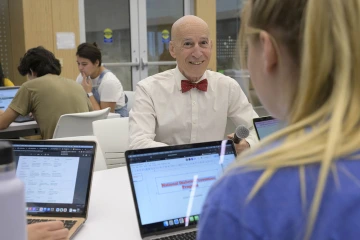
Paul Gordon, MD, was involved in the planning of the Bachelor of Science in Medicine program. He says it is one of nearly two dozen pre-health profession undergraduate curricula offered at the university.
“In my BSM 201 class, we talk about the social determinants of health. We talk about culture, race, gender, and we talk about the health care systems,” Dr. Gordon said. “Our students engage in a debate on health care systems. We do a group project on community needs assessments. And then, of course, we expose the students to the various health disciplines.”
In the Healthcare Professional course, students work in small groups to provide care for members of an imaginary multi-generational family from the perspective of different health disciplines. Each week, students rotate through the discipline they are representing. The health disciplines include doctor, nurse, pharmacist, physical therapist, nutritionist, psychologist, social worker, lawyer and public health worker. In addition to working within small groups, students are also split into teams made up of one representative from each group to conduct weekly patient case conferences.
“This is much like we do in a hospital when we have multidisciplinary teams talking about how to get the best care for a particular patient,” Dr. Gordon said. “My hope is that our students gain a multitude of perspectives in the health professions and that they gain a better understanding of interprofessional work,” Dr. Gordon said.
Checking the boxes
Nithin and Monica see the program as the ideal path to becoming a doctor.
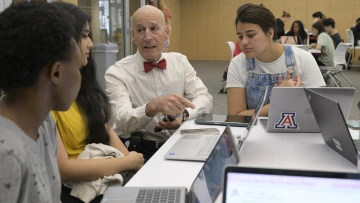
Dr. Gordon says the Bachelor of Science in Medicine program was started to better prepare students seeking to go into any health profession field.
“The BS in Medicine program introduces you to patient care, even in your first year,” Monica said. “We talk about cases, how to treat patients and how to provide accessible care. I really like that because it is not exclusively based on anatomy, even though we learn those things, too.”
Despite “medicine” being in the name, the program is not exclusive for those that want to practice medicine.
“It is interesting to meet other students who want to be something other than a doctor,” Monica said. “Those types of relationships can bring us different perspectives, like a public health perspective. Even simple things like what a patient might be thinking – we approach that differently given our backgrounds. So, it is helpful to hear something from another student that I may never have thought about.”
Graduates will be well prepared to enter careers directly in health care support positions or pursue alternative health care-related careers including medical marketing, medical technology, medical law, biomedical engineering, medical business and medical administration. The degree program also is another avenue students can take to enter advanced degree programs such as medicine, nursing, physical or occupational therapy, pharmacy and physician assistant.
“I feel very confident that our program offers things that the other undergraduate pre-health professional programs don’t,” Dr. Gordon said. “And if you finish our program, you will have checked off all the necessary boxes to allow you to apply to any of the health professional schools you want.”
Shaped by the pandemic
For years, there has been a critical need for more health care workers in the United States. The COVID-19 global pandemic added to the challenges, which include an increasing shortage of physicians and burnout affecting professions such as nursing.
The pandemic also served as the backdrop for the next generation of health care workers. Students like the Babu siblings, who just completed their freshman year of undergraduate studies, saw their high school experiences disrupted by the pandemic. While they may have missed out on some of the fun they hoped to have before college, it did provide a unique perspective.
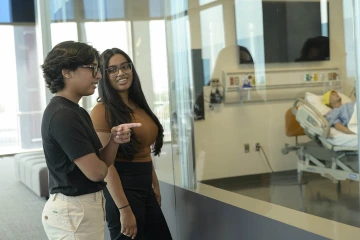
The Babu siblings were drawn to the Bachelor of Science in Medicine program for a number of reasons, but the introduction of clinical and patient care into the first-year curriculum was most appealing as undergraduate students.
“The pandemic taught us the importance of medicine beyond the individual,” Nithin said. “We learned how serious the situation was on a global scale, and how our health care system and those systems around the world were affected at the same time. It made me want to be a doctor even more.”
The College of Medicine – Tucson undergraduate programs, which also includes a Bachelor of Science in Health Sciences Physiology and Medical Sciences as well as a Bachelor of Science in Emergency Medical Services, have seen explosive growth in applications over the last year. Dr. Gordon said interest in the Bachelor of Science in Medicine program has already “far exceeded expectations.”
Nithin and Monica are among the many future health care providers at UArizona Health Sciences who are eager to address the health care workforce shortages. They believe the Bachelor of Science in Medicine program will help achieve that.
“If you are interested in medicine, you will be surrounded with a community and a culture that pushes you forward to new opportunities and introduces you to professors and other students that are on the same path as you,” Monica said. “But even if medicine is not for you, this is a great steppingstone and an inside look into what medicine is and what being a medical provider is all about.”
Our Experts
Paul Gordon, MD
Professor, Family and Community Medicine
Co-Director, Bachelor of Science in Medicine
Contact
Blair Willis
520-419-2979
bmw23@arizona.edu

